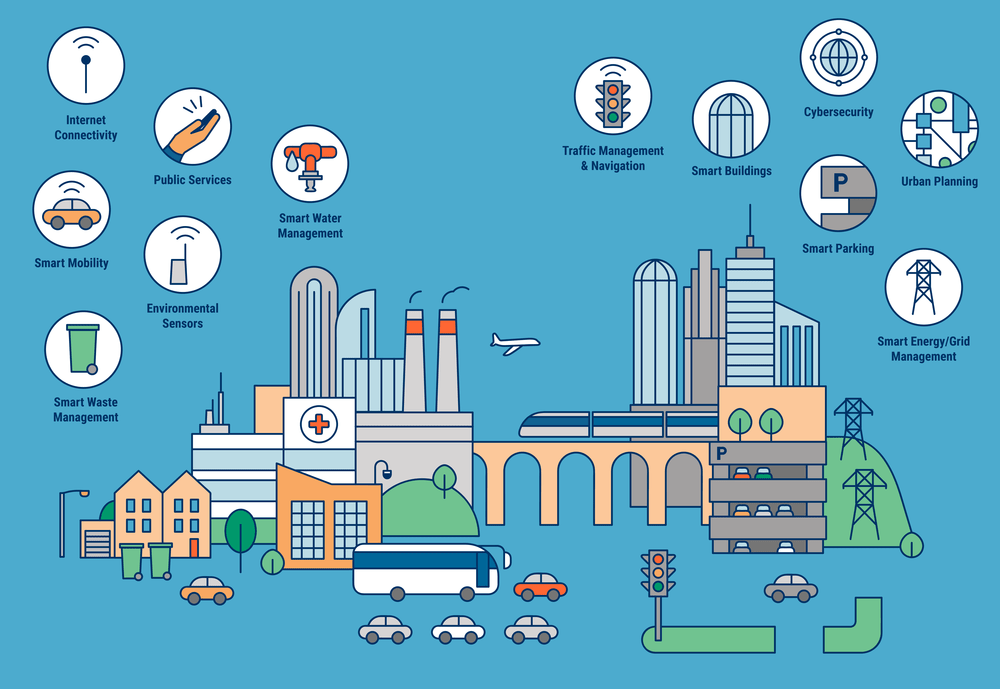The concept of smart cities is rapidly transforming community development, integrating advanced technologies to enhance urban infrastructure and improve the quality of life for residents. In this blog post, we explore the power of connectivity and how smart cities are revolutionizing the internet in 2024. By leveraging the Internet of Things (IoT) and embracing innovative solutions, cities are becoming more sustainable, efficient, and engaging for their citizens.
The Rise of Smart Cities
Smart cities are built upon the idea of utilizing technology and data to optimize the functioning of urban systems and improve the well-being of residents. These cities focus on integrating various technologies, such as sensor networks, intelligent transportation systems, and data analytics, to enhance the quality of services and infrastructure.
Technological advancements like 5G networks, artificial intelligence (AI), and cloud computing have played a significant role in the rise of smart cities. By leveraging these tools, city planners can gather real-time data, assess the needs of the community, and make data-driven decisions for better resource allocation and service delivery.
Many successful smart city initiatives have been implemented worldwide. For example, Singapore’s “Smart Nation” initiative has transformed the city-state into a model of urban sustainability, utilizing technologies to manage resources, enhance transportation systems, and improve the overall quality of life for residents. Barcelona, Spain, is another prime example, with initiatives such as smart parking, smart lighting, and waste management systems.
Smart cities offer numerous benefits to their residents. By embracing sustainable practices and optimizing resource management, they can reduce energy consumption, improve air quality, and minimize waste. Additionally, these cities prioritize safety through advanced surveillance systems, emergency response mechanisms, and intelligent traffic management, resulting in a safer environment for citizens.
The Internet of Things: Fueling Smart Cities’ Evolution
The Internet of Things (IoT) is a key component in the development of smart cities. It refers to the network of interconnected devices embedded with sensors and software that collect and exchange data. In the context of smart cities, the IoT plays a central role in connecting and optimizing various urban aspects.
IoT technology enables cities to collect real-time data from a variety of sources, including traffic sensors, weather stations, waste management systems, and energy monitoring devices. This data can be analyzed to identify patterns, predict future trends, and make data-driven decisions to enhance the functioning of the city.
Smart cities leverage IoT infrastructure to optimize transportation systems. Intelligent traffic management systems can monitor traffic flow, adjust traffic signals in real-time, and provide data-driven recommendations to improve traffic efficiency. This reduces congestion, decreases travel times, and enhances overall mobility within the city.
Another area where the IoT excels is in utilities management. Smart meters and sensors help monitor and regulate energy consumption, optimizing resource efficiency and allowing for more accurate billing. They also enable faster identification and resolution of service issues, ensuring a reliable supply of electricity, water, and gas to residents.
Waste management is yet another area that benefits from IoT integration. Smart bins equipped with sensors can monitor fill levels, optimizing collection routes and reducing operational costs. Furthermore, IoT-enabled waste management systems help promote recycling and environmental sustainability.
Connected Communities: Creating an Engaged, Transparent Society
Connectivity lies at the heart of smart cities, facilitating community engagement and participation. As cities become more connected, citizens can actively contribute to the decision-making process and have a say in shaping their urban environments.
Image courtesy of www.linkedin.com via Google Images
Smart city technology enables citizens to access real-time information and receive timely updates on public services, transportation schedules, and community events. Mobile applications and online platforms foster citizen engagement, allowing them to provide feedback, report issues, and participate in various community initiatives.
While connectivity brings numerous benefits, it also presents challenges. Privacy and data security are primary concerns when dealing with vast amounts of personal and sensitive data. Smart cities must prioritize robust cybersecurity measures to protect citizens’ privacy and ensure data integrity.
Despite the challenges, many cities around the world have successfully built connected communities. These communities leverage smart city technology to enhance public safety through neighborhood watch programs, emergency response systems, and effective communication channels. Additionally, connectivity enables the efficient delivery of crucial public services, such as healthcare, education, and social support.
Building Blocks of Smart Cities
The development of smart cities requires an ecosystem composed of various interconnected building blocks. While governments play a vital role in fostering smart city initiatives, collaboration between public and private sector entities, as well as citizen involvement, is essential.
Robust digital infrastructure is a fundamental requirement for smart cities to thrive. Cities need reliable high-speed internet connections, 5G networks, and a strong backbone of communication infrastructure to support the connectivity demands of smart city technology.
Data governance and cybersecurity measures are crucial to ensure the integrity, confidentiality, and transparency of citizen data. Smart cities must establish policies and regulations that govern the collection, storage, and utilization of data, protecting citizens’ rights and privacy.
Policymakers play a critical role in shaping smart city initiatives. They must create a supportive regulatory environment that encourages investment in smart technologies, incentivizes innovation, and empowers local communities to participate in the decision-making process.
Future Possibilities: Envisioning Smart Cities in 2024 and Beyond
The future of smart cities holds immense potential for societal advancements. Emerging trends such as artificial intelligence, machine learning, and automation will further enhance the capabilities of smart city technology.
Image courtesy of www.linkedin.com via Google Images
Artificial intelligence can enable predictive maintenance, optimize energy distribution, and improve public safety through intelligent surveillance systems. Machine learning algorithms can analyze vast amounts of data to identify patterns and provide insights for resource allocation and service improvement.
Smart homes will become more prevalent, integrating various IoT devices and providing residents with greater control over their energy consumption, security systems, and overall comfort. Electric vehicles and renewable energy integration will contribute to creating cleaner, sustainable urban landscapes.
However, the rapid advancement of technology also poses challenges. Issues related to job displacement, access to technology, and the ethical concerns surrounding the use of AI need to be addressed to ensure inclusivity and equitable access to smart city benefits.
In Conclusion
Smart cities represent the future of urban development, harnessing the power of technology and connectivity to create sustainable, efficient, and engaging communities. With the integration of the Internet of Things and the collaboration between stakeholders, cities are poised to transform the way we live, work, and interact with our environment. As we envision smart cities in 2024 and beyond, it is essential to prioritize data privacy, cybersecurity, and citizen participation to ensure the development of truly inclusive, resilient, and future-ready cities.





